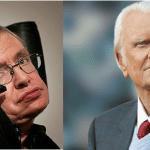
In DuVernay’s Selma, King’s faith was an integral aspect of King’s character and drive. I don’t think that non-Christian Selma fans felt that King’s religion made the film inaccessible or unwatchable—that they wished DuVernay had used a little artistic license and turned the pastor into a vacuum cleaner salesman or something. No, they understood that King was who he was. To alter such a critical aspect of his character would be a disservice to the character and immeasurably weaken the film.
What Disney’s done here isn’t so very different. By largely stripping L’Engle’s faith out of her sprawling universe, Disney removes something essential, something critical. The universe in the movie is still beautiful and still has some good to offer. But it’s not L’Engle’s universe anymore. And if it’s not L’Engle’s universe, what’s the point? Why buy the rights? Why not create a universe in keeping with the story you want to tell, rather than mucking up somebody else’s?
And frankly, punting Wrinkle’s Christian sensibilities warps not just a part of the story, but the point of it.
The central message of Disney’s Wrinkle seems to be this: You’re beautiful. You’re lovable. Have faith in yourself. The final line in the movie is, “I believe in me.”
There’s nothing inherently wrong in any of these messages, and these themes are indeed found in the book, too.
But for L’Engle, the theme of self-love and belief was just a marker along the way, not the finish line. In her work, love of self is only fruitful in the context of a wider whole, one in which duty, sacrifice and submission play heavily.
An example: In the book, Meg’s father yanks Meg away from a dangerous situation, knowing it leaves another loved one in peril. Meg’s furious with her Dad for leaving the loved one behind, and we understand her heartache. But in L’Engle’s mind, her father made the only move he could. Meg’s peevish anger is construed as the darkness of Camazotz working on her.
In the movie, Meg rebels against her father, too. And the movie rewards her for it.
For L’Engle, A Wrinkle in Time wasn’t about self-love as much as it was about growing up—and understanding that growing up sometimes forces you to make difficult decisions for a greater good. The movie, for all its worthwhile messages of courage and sacrifice, dares not go there. Instead, it encourages us to follow our hearts. To push on when even the wisest people in the universe advise caution. I believe in me.
A Wrinkle in Time, the movie, believes in itself. But the beauty of L’Engle’s book is that it believes in something else, too—something bigger, something wiser, something worth serving and, yes, worshiping. In that lies its power and beauty. And all the color and CGI magic present in the movie can’t hide its missing heart.













